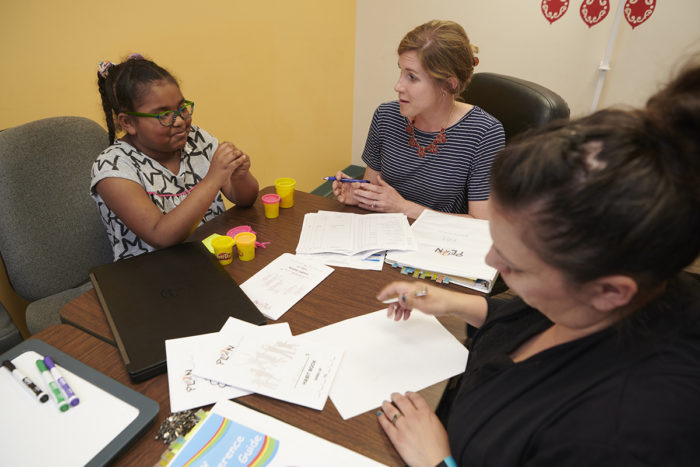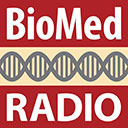$14 million to fund research aimed at reducing childhood obesity
Health-care providers will deliver family-based treatment
 Tim Parker
Tim ParkerSarah Kruger (center), a behavioral interventionist at the Washington University Center for Healthy Weight and Wellness, offers family-based behavioral weight loss treatment to Cecelia Betts (left) and her mother, Megan Betts (right), in the office of a St. Louis-area pediatrician.

Researchers at Washington University School of Medicine in St. Louis are receiving $14 million to test and evaluate a family-based program aimed at reducing childhood obesity.
The treatment program will be administered by health-care providers in primary-care settings in the St. Louis area, Louisiana and upstate New York. The project is funded by the Patient-Centered Outcomes Research Institute (PCORI), an independent, nonprofit organization authorized by Congress under the Affordable Care Act.
Led by researchers at the School of Medicine, the study also will involve the University of Rochester Medical Center in New York, the LSU Pennington Biomedical Research Center in Baton Rouge, La., and the American Academy of Pediatrics Institute for Healthy Childhood Weight in Itasca, Ill.
In the United States, one in five children and one in three adults are considered obese.
Health-care providers in the study will deliver 12 months of family-based treatment — which targets both the child with obesity as well as a parent with an unhealthy body weight. In previous smaller studies, this approach has reduced obesity in children and improved their markers of heart health while helping parents lose an average of 20 pounds.
For comparison purposes, others in the study will receive a standard intervention recommended by the American Academy of Pediatrics and the American Medical Association. The standard intervention will entail children and families receiving counseling focused on improving nutrition and increasing physical activity. They also will receive medical care focused on obesity and related conditions. If after three to six months a child and family need more support, they will be offered a more intensive strategy tailored to the needs and motivation of the child and family.
The family-based treatment component of the program encourages parents to become active participants in the treatment. For example, parents who are obese will be assisted in achieving their own weight-loss goals. This family-centered, comprehensive approach to weight loss is designed to help parents and children make lasting changes in eating and activity habits, while teaching positive parenting techniques that can be applied in a number of scenarios.
For example, the Washington University researchers previously have worked with parents and children to identify how to eat healthy meals while at school. The research team also has taught parents how to create a home environment that supports healthy eating and activity and to model healthy behaviors so that children learn from example to make healthier choices.
“With family-based treatment, one thing we’ve found repeatedly is that the better a parent does, the better the child does, and vice versa,” said principal investigator Denise E. Wilfley, PhD, the Scott Rudolph University Professor of Psychiatry and director of the Washington University Center for Healthy Weight and Wellness. “We not only see that they’re eating in healthier ways — for example, by increasing intake of fruits and vegetables and cutting back on unhealthy foods and sugar-sweetened beverages — we see big improvements in physical activity.”
Being overweight or obese increases risk for diabetes, heart disease, cancer, orthopedic problems, fatty liver disease — a potential precursor to cirrhosis and even liver cancer — and psychological problems such as depression and anxiety. And children considered obese have a high likelihood of remaining so throughout adulthood. The U.S. Preventive Services Task Force recommends that clinicians screen kids ages 6 and older for obesity and to offer or refer them to treatment.
Wilfley, also a professor of medicine, of pediatrics, and of psychological and brain sciences, said 15 to 25 pediatric and family medicine practices will be involved in this project. The American Academy of Pediatrics Institute for Healthy Childhood Weight will train pediatricians in each of the practices.
“It’s quite likely we may have upward of 100 child-care providers involved — including pediatricians, nurses and family-practice doctors — providers who are interested in child welfare and child health,” Wilfley said.
The project is one of several projects funded by PCORI, which supports research to provide patients, caregivers and clinicians with information that can be used to make better decisions about health care.
“This project was selected not only for its scientific merit and commitment to engaging patients and other health-care stakeholders in a major study conducted in a real-world setting, but also for its potential to answer important questions about childhood obesity and to fill a crucial evidence gap,” said PCORI Executive Director Joe Selby, MD. “We look forward to following the study’s progress and working with the researchers to share the results.”






